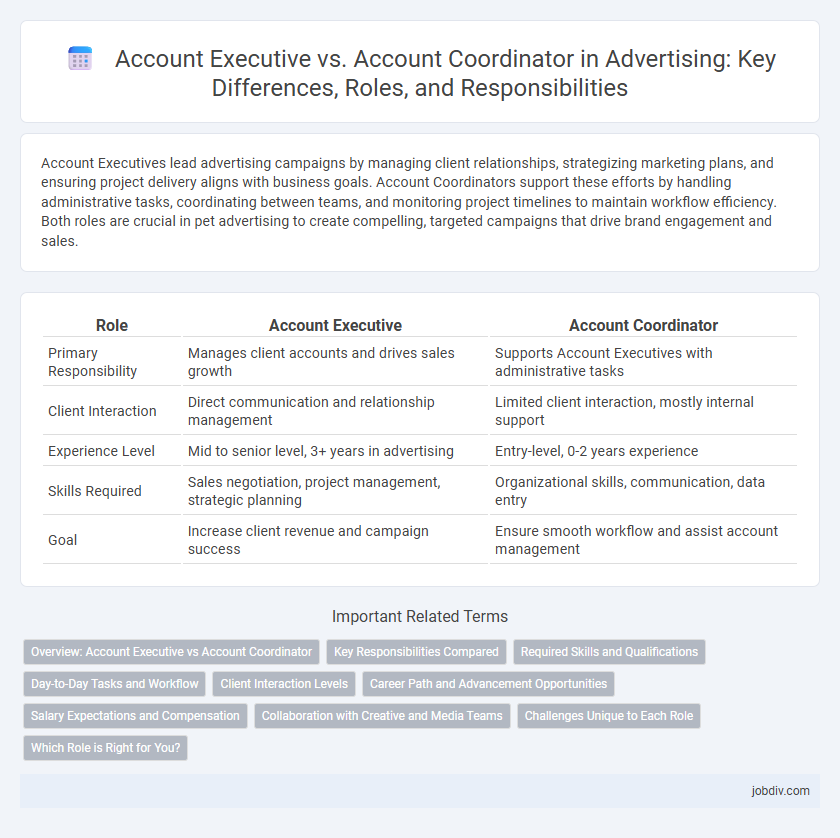Account Executives lead advertising campaigns by managing client relationships, strategizing marketing plans, and ensuring project delivery aligns with business goals. Account Coordinators support these efforts by handling administrative tasks, coordinating between teams, and monitoring project timelines to maintain workflow efficiency. Both roles are crucial in pet advertising to create compelling, targeted campaigns that drive brand engagement and sales.
Table of Comparison
| Role | Account Executive | Account Coordinator |
|---|---|---|
| Primary Responsibility | Manages client accounts and drives sales growth | Supports Account Executives with administrative tasks |
| Client Interaction | Direct communication and relationship management | Limited client interaction, mostly internal support |
| Experience Level | Mid to senior level, 3+ years in advertising | Entry-level, 0-2 years experience |
| Skills Required | Sales negotiation, project management, strategic planning | Organizational skills, communication, data entry |
| Goal | Increase client revenue and campaign success | Ensure smooth workflow and assist account management |
Overview: Account Executive vs Account Coordinator
Account Executives in advertising manage client relationships, develop strategic campaigns, and drive project execution to meet business objectives. Account Coordinators support Account Executives by handling administrative tasks, coordinating communication between teams, and ensuring deadlines are met. The Account Executive role emphasizes leadership and client management, while the Account Coordinator position focuses on operational support and team collaboration.
Key Responsibilities Compared
Account Executives primarily manage client relationships and oversee campaign execution, ensuring alignment with strategic goals and budget constraints. Account Coordinators support these efforts through administrative tasks, coordinating communication between clients and creative teams, and managing project workflows to maintain deadlines. While Account Executives drive client satisfaction and business growth, Account Coordinators focus on operational efficiency and internal collaboration.
Required Skills and Qualifications
Account Executives in advertising require strong client management, strategic thinking, and negotiation skills, often supported by a bachelor's degree in marketing or communications and experience in account handling. Account Coordinators need excellent organizational, communication, and multitasking abilities, typically holding entry-level qualifications such as a marketing or business degree and proficiency in project management tools. Both roles demand a solid understanding of advertising principles, teamwork, and deadline-oriented work habits to effectively support campaign execution and client satisfaction.
Day-to-Day Tasks and Workflow
Account Executives oversee client relationships, manage campaign strategies, and coordinate between creative teams and clients to ensure project alignment with client goals. Account Coordinators support Account Executives by handling administrative tasks, preparing reports, maintaining schedules, and facilitating internal communication to keep campaigns organized. Workflow for Account Executives centers on strategic decision-making and client interaction, while Account Coordinators focus on execution and logistical support to streamline daily operations.
Client Interaction Levels
Account Executives maintain direct communication with clients, managing relationships and ensuring campaign objectives align with client goals. Account Coordinators support this process by handling day-to-day communications and coordinating internal teams to facilitate smooth project execution. The higher client interaction level of Account Executives requires strong negotiation skills and strategic thinking, while Account Coordinators focus on administrative support and detailed follow-ups.
Career Path and Advancement Opportunities
Account Executives in advertising typically manage client relationships and lead campaign execution, positioning themselves for senior roles like Account Manager or Director with increased strategic responsibilities. Account Coordinators usually start in entry-level positions supporting account teams, gaining foundational skills and industry knowledge essential for advancement to Account Executive roles. The career path from Coordinator to Executive highlights skill acquisition, client interaction, and project management as critical milestones for advancement opportunities within advertising agencies.
Salary Expectations and Compensation
Account Executives in advertising typically command higher salary expectations, with averages ranging from $60,000 to $90,000 annually, reflecting their greater client management responsibilities. Account Coordinators generally earn between $35,000 and $50,000, as they primarily handle administrative and support tasks within the account team. Compensation packages for Account Executives often include performance bonuses and commission structures tied to client acquisition and retention, whereas Account Coordinators receive more stable, entry-level salaries with limited incentive-based pay.
Collaboration with Creative and Media Teams
Account Executives serve as the primary liaison between clients and internal teams, ensuring seamless collaboration with Creative and Media departments to develop targeted advertising strategies. Account Coordinators support this process by managing communication flow, coordinating project timelines, and gathering essential data to keep Creative and Media teams aligned with client objectives. Both roles facilitate strong teamwork that drives campaign effectiveness and timely delivery.
Challenges Unique to Each Role
Account Executives face challenges that include managing client expectations, driving revenue targets, and coordinating multi-channel campaigns under tight deadlines. Account Coordinators grapple with balancing administrative tasks, supporting multiple account teams simultaneously, and gaining industry experience while ensuring communication flows smoothly between clients and internal teams. Both roles demand adaptability, strong communication skills, and the ability to navigate complex client-agency dynamics in fast-paced advertising environments.
Which Role is Right for You?
Account Executives lead client relationships and manage strategic campaigns, requiring strong communication skills and experience in project management. Account Coordinators support Account Executives with administrative tasks and coordination, making this role ideal for entry-level professionals seeking industry exposure. Choose Account Executive for leadership growth or Account Coordinator for foundational experience in advertising.
Account Executive vs Account Coordinator Infographic

 jobdiv.com
jobdiv.com